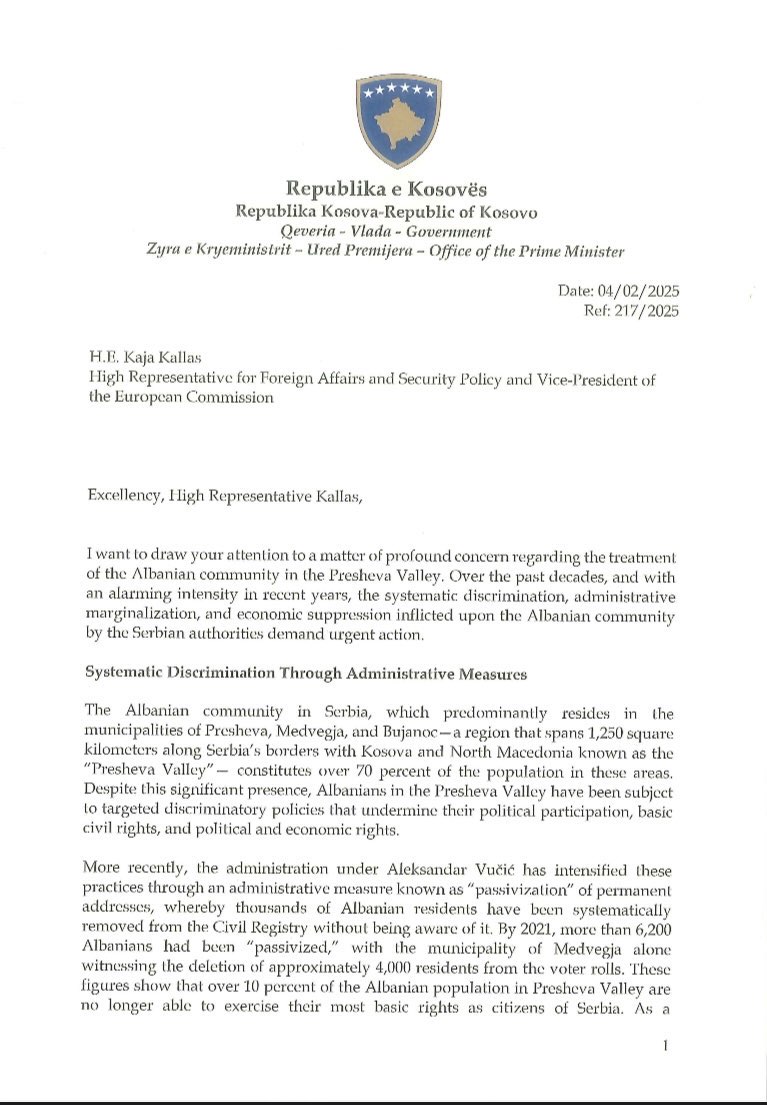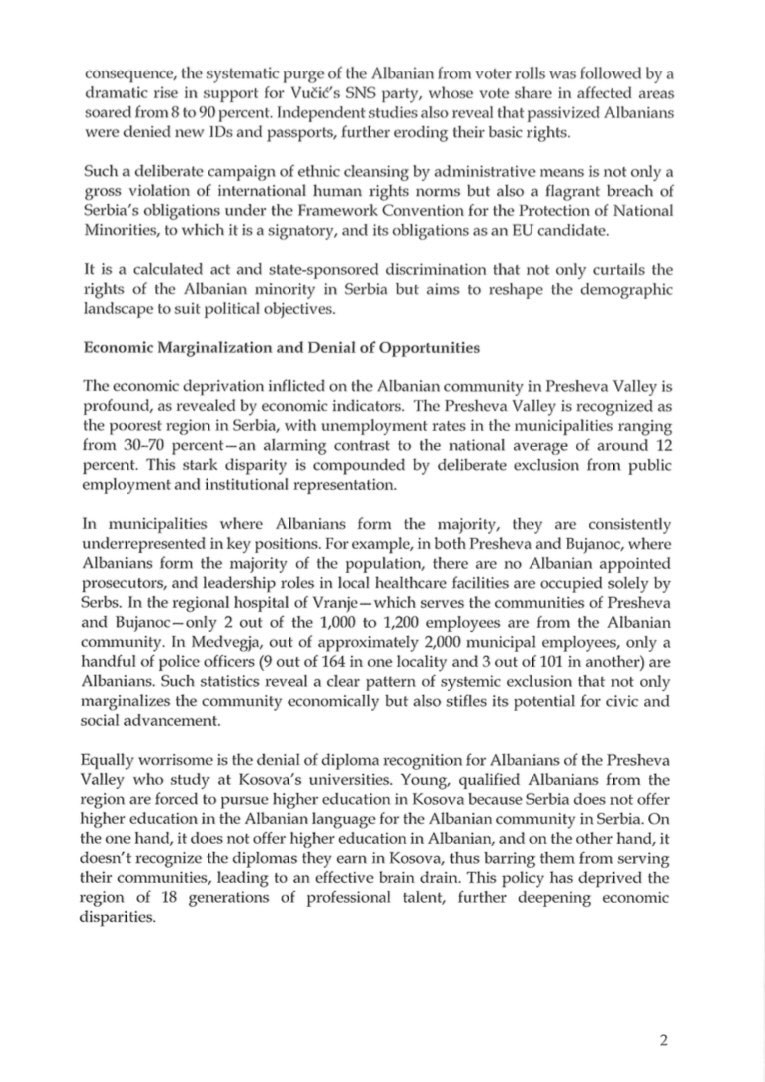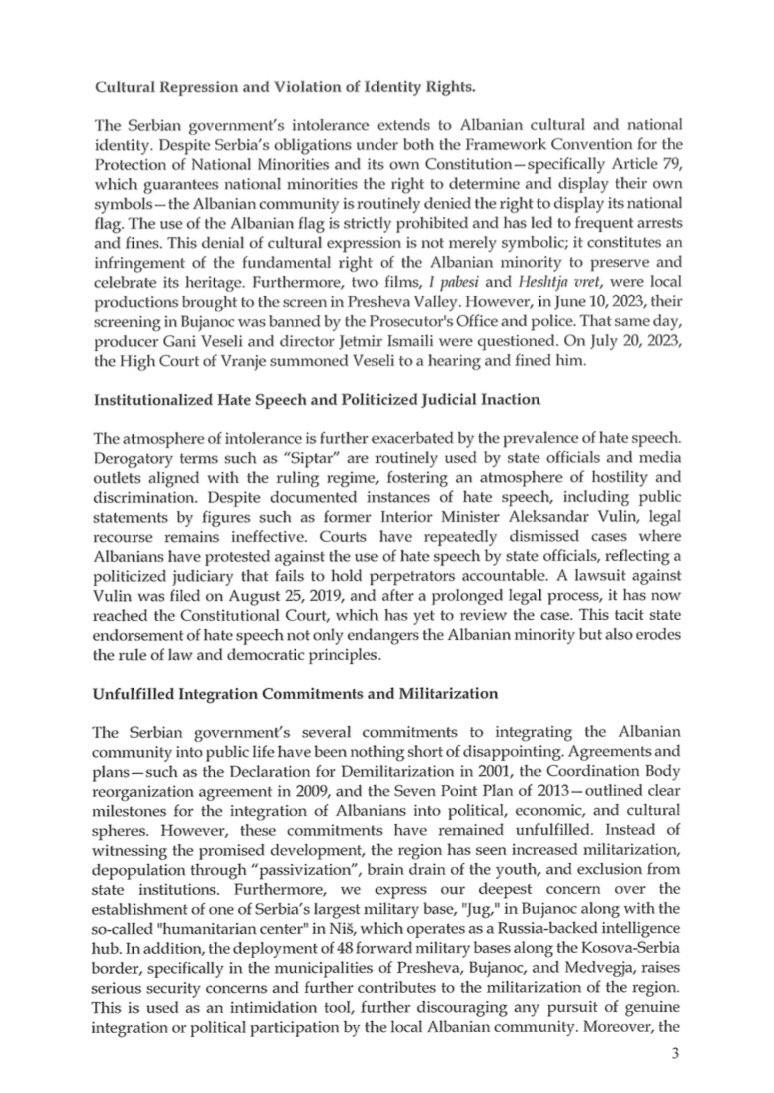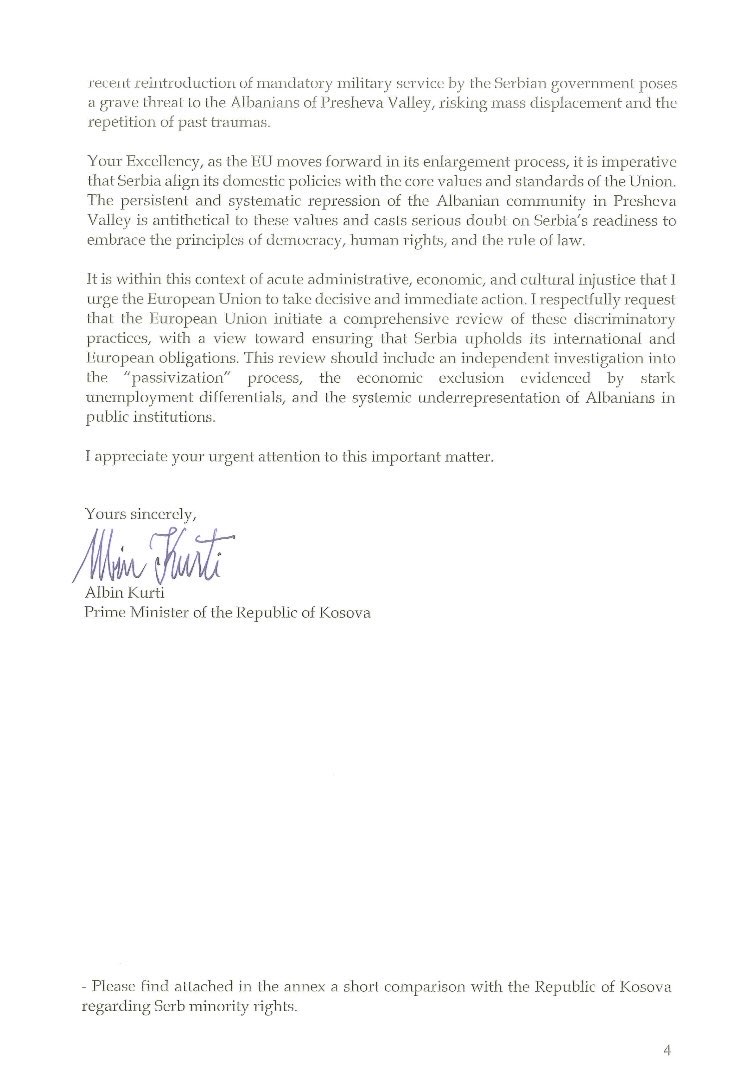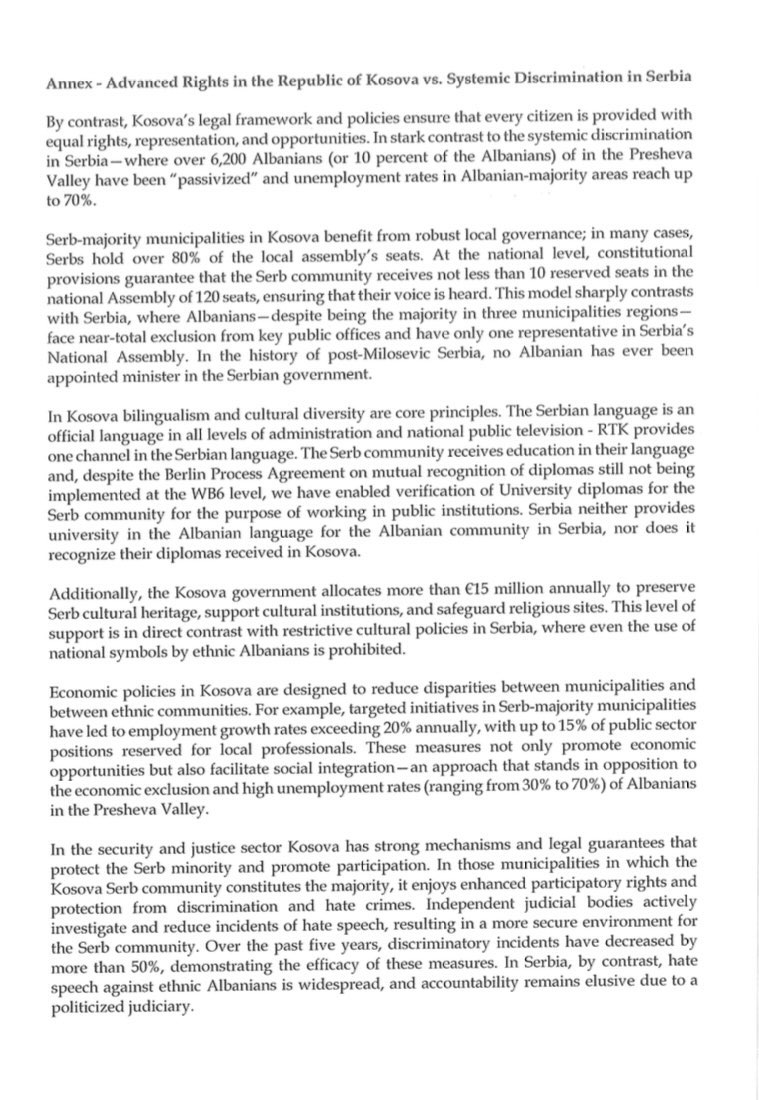Prishtina, February 11, 2025
The Prime Minister of the Republic of Kosova, Albin Kurti, has addressed to the High Representative for Foreign Affairs and Security Policy and the Vice-President of the European Commission, Kaja Kallas, an official letter on the ongoing violations of the rights of Albanians in the Presheva Valley by the Serbian regime.
He wrote that “Over the past decades, and with an alarming intensity in recent years, the systematic discrimination, administrative marginalization, and economic suppression inflicted upon the Albanian community by the Serbian authorities demand urgent action.”
Throughout the letter, Prime Minister Kurti informed High Representative Kallas about a series of violations of the rights of Albanians, from the passivization of addresses and ethnic cleansing through administrative means, to economic marginalization, underrepresentation in institutions, militarization, hate speech and lack of integration.
“It is within this context of acute administrative, economic, and cultural injustice that I urge the European Union to take decisive and immediate action. I respectfully request that the European Union initiate a comprehensive review of these discriminatory practices, with a view toward ensuring that Serbia upholds its international and European obligations. This review should include an independent investigation into the “passivization” process, the economic exclusion evidenced by stark unemployment differentials, and the systemic underrepresentation of Albanians in public institutions.” wrote the Prime Minister at the end of his letter.
Prime Minister Kurti’s letter:
Excellency, High Representative Kallas,
I want to draw your attention to a matter of profound concern regarding the treatment of the Albanian community in the Presheva Valley. Over the past decades, and with an alarming intensity in recent years, the systematic discrimination, administrative marginalization, and economic suppression inflicted upon the Albanian community by the Serbian authorities demand urgent action.
Systematic Discrimination Through Administrative Measures
The Albanian community in Serbia, which predominantly resides in the municipalities of Presheva, Medvegja, and Bujanoc—a region that spans 1,250 square kilometers along Serbia’s borders with Kosova and North Macedonia known as the “Presheva Valley”— constitutes over 70 percent of the population in these areas. Despite this significant presence, Albanians in the Presheva Valley have been subject to targeted discriminatory policies that undermine their political participation, basic civil rights, and political and economic rights.
More recently, the administration under Aleksandar Vučić has intensified these practices through an administrative measure known as “passivization” of permanent addresses, whereby thousands of Albanian residents have been systematically removed from the Civil Registry without being aware of it. By 2021, more than 6,200 Albanians had been “passivized,” with the municipality of Medvegja alone witnessing the deletion of approximately 4,000 residents from the voter rolls. These figures show that over 10 percent of the Albanian population in Presheva Valley are no longer able to exercise their most basic rights as citizens of Serbia. As a consequence, the systematic purge of the Albanian from voter rolls was followed by a dramatic rise in support for Vučić’s SNS party, whose vote share in affected areas soared from 8 to 90 percent. Independent studies also reveal that passivized Albanians were denied new IDs and passports, further eroding their basic rights.
Such a deliberate campaign of ethnic cleansing by administrative means is not only a gross violation of international human rights norms but also a flagrant breach of Serbia’s obligations under the Framework Convention for the Protection of National Minorities, to which it is a signatory, and its obligations as an EU candidate.
It is a calculated act and state-sponsored discrimination that not only curtails the rights of the Albanian minority in Serbia but aims to reshape the demographic landscape to suit political objectives.
Economic Marginalization and Denial of Opportunities
The economic deprivation inflicted on the Albanian community in Presheva Valley is profound, as revealed by economic indicators. The Presheva Valley is recognized as the poorest region in Serbia, with unemployment rates in the municipalities ranging from 30–70 percent—an alarming contrast to the national average of around 12 percent. This stark disparity is compounded by deliberate exclusion from public employment and institutional representation.
In municipalities where Albanians form the majority, they are consistently underrepresented in key positions. For example, in both Presheva and Bujanoc, where Albanians form the majority of the population, there are no Albanian appointed prosecutors, and leadership roles in local healthcare facilities are occupied solely by Serbs. In the regional hospital of Vranje—which serves the communities of Presheva and Bujanoc—only 2 out of the 1,000 to 1,200 employees are from the Albanian community. In Medvegja, out of approximately 2,000 municipal employees, only a handful of police officers (9 out of 164 in one locality and 3 out of 101 in another) are Albanians. Such statistics reveal a clear pattern of systemic exclusion that not only marginalizes the community economically but also stifles its potential for civic and social advancement.
Equally worrisome is the denial of diploma recognition for Albanians of the Presheva Valley who study at Kosova’s universities. Young, qualified Albanians from the region are forced to pursue higher education in Kosova because Serbia does not offer higher education in the Albanian language for the Albanian community in Serbia. On the one hand, it does not offer higher education in Albanian, and on the other hand, it doesn’t recognize the diplomas they earn in Kosova, thus barring them from serving their communities, leading to an effective brain drain. This policy has deprived the region of 18 generations of professional talent, further deepening economic disparities.
Cultural Repression and Violation of Identity Rights.
The Serbian government’s intolerance extends to Albanian cultural and national identity. Despite Serbia’s obligations under both the Framework Convention for the Protection of National Minorities and its own Constitution—specifically Article 79, which guarantees national minorities the right to determine and display their own symbols—the Albanian community is routinely denied the right to display its national flag. The use of the Albanian flag is strictly prohibited and has led to frequent arrests and fines. This denial of cultural expression is not merely symbolic; it constitutes an infringement of the fundamental right of the Albanian minority to preserve and celebrate its heritage. Furthermore, two films, I pabesi and Heshtja vret, were local productions brought to the screen in Presheva Valley. However, in June 10, 2023, their screening in Bujanoc was banned by the Prosecutor’s Office and police. That same day, producer Gani Veseli and director Jetmir Ismaili were questioned. On July 20, 2023, the High Court of Vranje summoned Veseli to a hearing and fined him.
Institutionalized Hate Speech and Politicized Judicial Inaction
The atmosphere of intolerance is further exacerbated by the prevalence of hate speech. Derogatory terms such as “Siptar” are routinely used by state officials and media outlets aligned with the ruling regime, fostering an atmosphere of hostility and discrimination. Despite documented instances of hate speech, including public statements by figures such as former Interior Minister Aleksandar Vulin, legal recourse remains ineffective. Courts have repeatedly dismissed cases where Albanians have protested against the use of hate speech by state officials, reflecting a politicized judiciary that fails to hold perpetrators accountable. A lawsuit against Vulin was filed on August 25, 2019, and after a prolonged legal process, it has now reached the Constitutional Court, which has yet to review the case. This tacit state endorsement of hate speech not only endangers the Albanian minority but also erodes the rule of law and democratic principles.
Unfulfilled Integration Commitments and Militarization
The Serbian government’s several commitments to integrating the Albanian community into public life have been nothing short of disappointing. Agreements and plans—such as the Declaration for Demilitarization in 2001, the Coordination Body reorganization agreement in 2009, and the Seven Point Plan of 2013—outlined clear milestones for the integration of Albanians into political, economic, and cultural spheres. However, these commitments have remained unfulfilled. Instead of witnessing the promised development, the region has seen increased militarization, depopulation through “passivization”, brain drain of the youth, and exclusion from state institutions. Furthermore, we express our deepest concern over the establishment of one of Serbia’s largest military base, “Jug,” in Bujanoc along with the so-called “humanitarian center” in Niš, which operates as a Russia-backed intelligence hub. In addition, the deployment of 48 forward military bases along the Kosova-Serbia border, specifically in the municipalities of Presheva, Bujanoc, and Medvegja, raises serious security concerns and further contributes to the militarization of the region. This is used as an intimidation tool, further discouraging any pursuit of genuine integration or political participation by the local Albanian community. Moreover, the recent reintroduction of mandatory military service by the Serbian government poses a grave threat to the Albanians of Presheva Valley, risking mass displacement and the repetition of past traumas.
Your Excellency, as the EU moves forward in its enlargement process, it is imperative that Serbia align its domestic policies with the core values and standards of the Union. The persistent and systematic repression of the Albanian community in Presheva Valley is antithetical to these values and casts serious doubt on Serbia’s readiness to embrace the principles of democracy, human rights, and the rule of law.
It is within this context of acute administrative, economic, and cultural injustice that I urge the European Union to take decisive and immediate action. I respectfully request that the European Union initiate a comprehensive review of these discriminatory practices, with a view toward ensuring that Serbia upholds its international and European obligations. This review should include an independent investigation into the “passivization” process, the economic exclusion evidenced by stark unemployment differentials, and the systemic underrepresentation of Albanians in public institutions.
I appreciate your urgent attention to this important matter.
Yours sincerely,
Albin Kurti
Prime Minister of the Republic of Kosova
– Please find attached in the annex a short comparison with the Republic of Kosova regarding Serb minority rights.
Annex – Advanced Rights in the Republic of Kosova vs. Systemic Discrimination in Serbia
By contrast, Kosova’s legal framework and policies ensure that every citizen is provided with equal rights, representation, and opportunities. In stark contrast to the systemic discrimination in Serbia—where over 6,200 Albanians (or 10 percent of the Albanians) of in the Presheva Valley have been “passivized” and unemployment rates in Albanian-majority areas reach up to 70%.
Serb-majority municipalities in Kosova benefit from robust local governance; in many cases, Serbs hold over 80% of the local assembly’s seats. At the national level, constitutional provisions guarantee that the Serb community receives not less than 10 reserved seats in the national Assembly of 120 seats, ensuring that their voice is heard. This model sharply contrasts with Serbia, where Albanians—despite being the majority in three municipalities regions—face near-total exclusion from key public offices and have only one representative in Serbia’s National Assembly. In the history of post-Milosevic Serbia, no Albanian has ever been appointed minister in the Serbian government.
In Kosova bilingualism and cultural diversity are core principles. The Serbian language is an official language in all levels of administration and national public television – RTK provides one channel in the Serbian language. The Serb community receives education in their language and, despite the Berlin Process Agreement on mutual recognition of diplomas still not being implemented at the WB6 level, we have enabled verification of University diplomas for the Serb community for the purpose of working in public institutions. Serbia neither provides university in the Albanian language for the Albanian community in Serbia, nor does it recognize their diplomas received in Kosova.
Additionally, the Kosova government allocates more than €15 million annually to preserve Serb cultural heritage, support cultural institutions, and safeguard religious sites. This level of support is in direct contrast with restrictive cultural policies in Serbia, where even the use of national symbols by ethnic Albanians is prohibited.
Economic policies in Kosova are designed to reduce disparities between municipalities and between ethnic communities. For example, targeted initiatives in Serb-majority municipalities have led to employment growth rates exceeding 20% annually, with up to 15% of public sector positions reserved for local professionals. These measures not only promote economic opportunities but also facilitate social integration—an approach that stands in opposition to the economic exclusion and high unemployment rates (ranging from 30% to 70%) of Albanians in the Presheva Valley.
In the security and justice sector Kosova has strong mechanisms and legal guarantees that protect the Serb minority and promote participation. In those municipalities in which the Kosova Serb community constitutes the majority, it enjoys enhanced participatory rights and protection from discrimination and hate crimes. Independent judicial bodies actively investigate and reduce incidents of hate speech, resulting in a more secure environment for the Serb community. Over the past five years, discriminatory incidents have decreased by more than 50%, demonstrating the efficacy of these measures. In Serbia, by contrast, hate speech against ethnic Albanians is widespread, and accountability remains elusive due to a politicized judiciary.
Last modified: February 11, 2025
